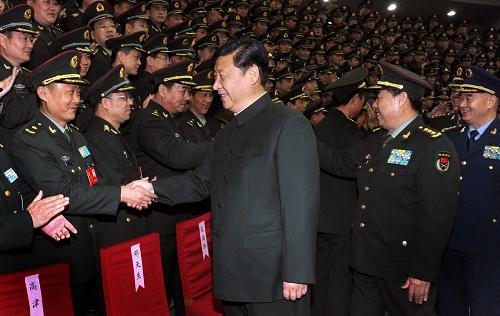
New Chinese Leader Meets Military Nuclear Officers
2012 – 2020: Xi Jinping & Chinese nuclear forces
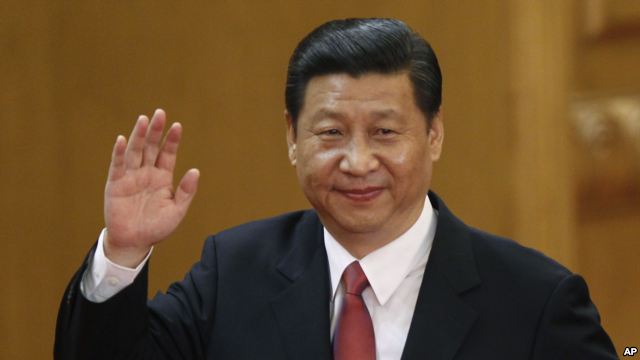
December 5, 2012
BEIJING — The new Chinese leader, Xi Jinping, met Wednesday with officers of the military unit that oversees the land-based ballistic and cruise missiles of China’s nuclear force, the state-run news agency Xinhua said, in the latest indication that Mr. Xi is moving quickly to solidify his control of the armed forces.
China’s New Leadership: Full Coverage
In his third public event with the military since taking office last month, Mr. Xi praised the nuclear unit, the Second Artillery Corps, as “a strategic pillar of our great power status,” Xinhua reported, a pointed reference to the military’s role in elevating China to a greater role in global affairs.
“The Second Artillery Corps is the core force of our country’s strategic deterrent, it is a strategic pillar of our great power status, and an important bedrock for protecting our national security,” Mr. Xi said.

Mr. Xi took over as civilian chairman of the military from President Hu Jintao at the Communist Party Congress, the first Chinese leader since 1976 to assume the positions as head of the party and head of the military at the same time.
Mr. Xi now runs the military from his position as head of the 12-member Central Military Commission, and he was accompanied at the meeting in Beijing on Wednesday by the uniformed members of the commission, according to Xinhua.
In his remarks to the Second Artillery Corps officers, Mr. Xi reminded them that they must be totally loyal to the Communist Party, and that the military had to “put an end” to corruption. A senior army officer, Gu Junshan, was arrested this year on suspicion of corruption and is expected to go on trial next year.
The case has been mentioned by military experts as an indication of an early effort by Mr. Xi to curb excesses of illicit land deals and other corrupt practices in the military.
Mr. Xi’s father was a revered general in the revolutionary forces that brought the Communist Party to power. As he cultivates his own close relations with the fast modernizing Chinese Army, he appears to be paying particular attention to the nuclear command.
Mr. Xi promoted the commander of the Second Artillery Corps, Wei Fenghe, to full general last month. General Wei was the first high-level officer to receive a promotion from Mr. Xi, who attended the promotion ceremony.
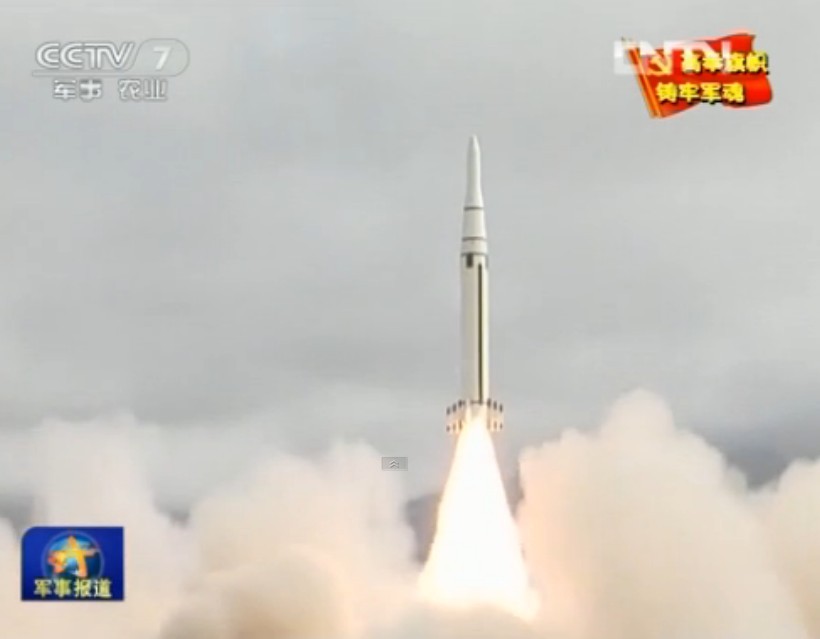
习近平会见二炮党代表强调”战略威慑”意义重大
人民网12月6日电 据香港《文汇报》报道,中共中央总书记、中央军委主席习近平昨日会见第二炮兵第八次党代表大会代表,并发表了重要讲话。有关专家接受港媒采访时指出,习近平在会见二炮党代会代表时的讲话,有两点值得高度关注:一是中共最高领导人首次在公开场合全面阐述中国战略核力量的任务、地位和使命,凸显出对进一步塑造战略威慑核心能力、铸就“和平之盾”的高度重视;二是体现出新一届军委推动解放军信息化建设加速发展的坚定决心。
威慑不等于威胁
曾任中国驻俄罗斯武官的王海运少将表示,战略核威慑是国际政治的术语,习主席讲的威慑不等于威胁,是中国谋求和平的手段,不是战争手段。“冷战时代,美苏多次发生危机并未演变成战争,表明战略威慑是核条件下维护和平的重要手段。目前,美国对中国采取遏制战略,目的是不想让中国挑战其全球战略的主导地位,也是一种威慑。”王海运指出,在十八大报告中有关军事的部分,特别强调了中国军队在2020年基本建成信息化、机械化的战略任务,因此习近平的讲话,不仅是对二炮的要求,亦是对全军各军、兵种的要求,体现出中国新一代领导集体全新的战略思维和国家战略目标选择。
国防大学教授李大光认为,习近平会见信息化程度较高的战略导弹部队,充分反映出新一届军委对加快军队信息化进程的重视。
二炮日趋现代化
另有专家指出,因应信息时代要求,当前世界各国非常重视发展战略武器,提高战略威慑能力。各国核打击力量的装备、部署都是军队的最高机密之一。有46年历史的二炮部队,是解放军各军种中最年轻的部队。中国战略导弹“家族”已由单一型号发展为近、中、远程和洲际导弹多型并存,目前以东风31系列、东风5、东风21战略战术导弹为主体。二炮的现代化武器体系也日趋完善,为今后装备信息化水平提升奠定了坚实基础。
习近平在会见二炮党代会代表 – 2012-12-06 00:55 新华网
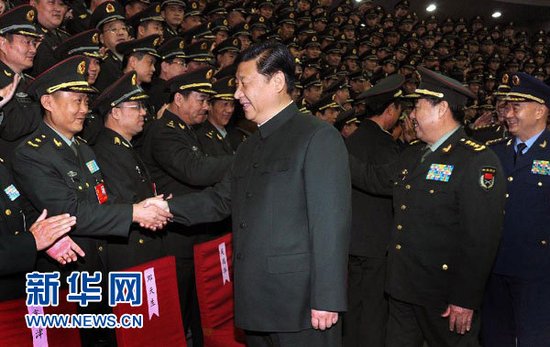
习近平会见二炮党代会代表[组图]
12月5日,中共中央总书记、中央军委主席习近平会见了第二炮兵第八次党代表大会代表时强调,要深入学习贯彻党的十八大精神,高举中国特色社会主义伟大旗帜,以邓小平理论、“三个代表”重要思想、科学发展观为指导,坚持国防和军队建设主题主线,加强部队全面建设和军事斗争准备,努力建设一支强大的信息化战略导弹部队。
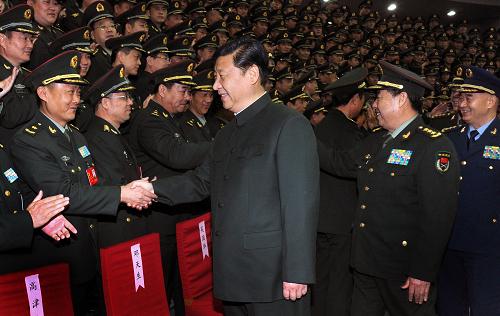
http://www.backchina.com/news/2017/09/01/513611.html
解放军陆海空3军全换帅,1上将2中将上任
http://www.backchina.com/news/2017/09/01/513706.html
马哓天
习近平较高,但很多人一样高
http://news.sina.com.cn/c/2013-08-28/181528071795.shtml
习近平视察武警部队 紧握住枪杆子 为新政保驾护航
1月29日,中华民族的传统节日春节来临之际,中共中央总书记、中共中央军委主席习近平到武警部队视察,代表党中央、国务院和中央军委,向武警部队全体官兵致以节日的问候。这是习近平在武警北京市总队十三支队向新兵详细了解新兵训练和生活情况。新华社记者 李刚 摄
许其亮视察海军舰艇
走马上任,解放军新领导团队“影响力非常强”
“陆军化”、“区块化”风格明显,大军区制面临变革
统率海陆空天及二炮部队,“战区司令部”非同凡响
中国人民解放军最高领导团队最近完成了一系列重大调整。这些军方高层要员的更替包括新的解放军空军司令员和二炮司令员的晋升、解放军四大总部领导人的确定以及中央军委领导班子的组成。
美国詹姆斯敦基金会最近刊登长篇文章指出,“这是一个影响力非常强的群体,他们控制着中国快速现代化的武装部队”。在这次大规模人事变动中,最重要的是两个高级军事官员的晋升——原济南军区司令员范长龙和原解放军空军司令员许其亮担任新一届中央军事委员会的副主席。作为中国等级最高的军事官员,范长龙和许其亮在解放军现代化的一些重要方面将担负重要责任,包括解放军作战指挥体系的变革和一直希望提高的“一体化”作战能力。
一些西方媒体着重分析了新一届中央军委班子对解放军军事现代化的影响。其中一个最大的特点是,与以往中央军委的人员构成相比,非陆军将领的数量明显增多,而且作为中央军委副主席,许其亮是第一位担任此重要职务的空军将领,凸显出空军在解放军现代化战争中担负的重大职责和使命。众所周知,中国传统的七大军区划分是以陆军为基础、以防卫全国七大区域为己任,当初设立时并没有考虑到陆军、空军、海军和导弹部队未来会进行如此高难度的多军种一体化协同作战,但世界现代战争指挥体系正在发生巨大变化,为了更好地协调各军种之间的大规模军事行动,美国一些军事专家猜测,中国未来可能会借鉴西方经验,将七大军区转型为“战区司令部”,以便更加有效地统率所在区域的海陆空天及导弹力量。
詹姆斯敦基金会的文章认为,通常人们关注的是解放军先进武器和重大军事能力的发展,毕竟这些现代化作战武器的亮相更夺人眼球。但是,要发挥这些不同军种的先进武器的“集体作战力量”,解放军必须从制度和组织上改变“陆军化”和“区块化”风格,这才是中国新军事变革中最难的一道关、也是最重要的一道关。只有在指挥结构更加合理、多军种协同作战更加通畅的情况下,解放军才能真正发挥出强大的作战能力。
两位副主席是“军中悍将”
范长龙曾是一位训练有素的炮兵,现年65岁。范长龙从1969年开始参加解放军,当时他22岁。2002年,范长龙被晋升为中将,而后在2003年又被任命为解放军总参谋长的助理之一。2004年,范长龙成为济南军区司令员。在这个岗位上,范长龙干了8年时间,直到最近晋升为中央军委副主席。
作为济南军区的司令员,范长龙为规划和执行先进的“联合后勤”创造了一个史无前例的纪录。在2008年,范长龙印证了这一能力的强大。当时四川汶川发生特大地震灾害,范长龙亲自率领一支重要的先遣队,作为济南军区抗震救灾应急部队的开路先锋。这一成功无疑令范长龙作为一名军区领导人在关键时刻的勇气和魄力得到彰显,这也可能是他史无前例地从一个军区司令员直升为中央军委副主席的最大原因。此前,范长龙并不是中央军委委员。
许其亮是中国历史上首位被任命为中央军委副主席的空军将领,这一职位通常都由陆军将领担任。1984年,年仅34岁的许其亮就成为解放军空军第四军副军长,后来又担任驻福州的空军第八军军长。1990年,年仅40岁的许其亮成为解放军最年轻的空军军长。2004年,许其亮被晋升为解放军副总参谋长,2007年,许其亮升任解放军空军司令员。在过去的40年时间里,许其亮为自己创造了一个毫无瑕疵的军旅生涯,2007年被晋升为上将,并在当年10月成为中央军委委员。按照70岁退役的规定,许其亮和范长龙作为中央军委副主席辅佐习近平,直至2017年的中共19大。
对于一些观察家来说,范长龙的晋升多少有些出人意料,因为他越过了中央军委委员这一级,直接升任中央军委副主席。不过许其亮的任命可能更为重要,这主要有两个方面的原因。首先,众所周知,许其亮是建立中国强大航空航天力量的极力倡导者,而且成为中央军委副主席之后,也能令许其亮实现自己“打造一支更加现代化、能力更强的解放军空军”的愿望。许其亮曾经表示,“解放军空军必须锻造锋利的‘剑’和坚固的‘盾牌’,有能力赢得和平。这样才有助于保卫中国的利益”。
如果说许其亮有关空间军事竞争必然会加剧的说法是某种暗示的话,那就表明中国的“剑”和“盾牌”包括反卫星与其他太空控制能力,以及确保中国出于军事目的利用太空、限制敌方出于同样目的利用太空的能力。
许其亮对解放军空军在太空战中发挥作用的提倡,可能正是太空领域国际竞争的体现——中国战略家认为太空战是未来战争中的潜在决定性因素。其次,许其亮是首位被任命为中共中央军事委员会副主席的空军将领——该机构通常由解放军地面部队占主导地位。因此,许其亮的晋升体现了中国军方对追求西式联合作战行动的渴望,以及对提高解放军空军、海军和二炮部队战略相关性和影响力的渴望。
或用“战区司令部”取代大军区
特别值得注意的是,许其亮被任命为军委副主席体现了一种更广泛的趋势,即非地面部队军种正在获得更大话语权。自2004年以来,被提升到更重要的军事领导岗位上的解放军空军、海军和二炮部队官员数量空前增多。这种变化归功于中国提升解放军联合作战能力的长期努力。不过,对于一个历来重视地面力量的国家而言,这是一项具有挑战性的工作。无论如何,鉴于许其亮的背景,可以预测到解放军空军的利益将比以往更受重视,特别是因为许其亮并非中央军委的唯一空军官员。作为新任解放军空军司令员,马晓天将军同样会在中央军委强调空军的作用。两名空军官员在中国最高军事机构任职的事实,再加上解放军海军和二炮部队预算开支的提高,可能预示着主导地面作战的陆军对中国军力长达60年的控制将会减弱。
无论如何,地面部队、解放军海军、空军和二炮部队之间实现西式联合作战行动所需的真正默契,还需要很长的时间。首先,作为军委副主席,许其亮不能像身为空军司令员那样大力提倡发展空军。因为,许其亮不想让别人认为他会以牺牲其他军种为代价发展解放军空军。其次,可能最重要的一点是,在解放军某些重要方面,地面部队仍然占主导地位。地面部队的主导地位不只体现在陆军在解放军四总部的领导地位——四总部更像是地面部队的总部,而不是联合总部——还体现在解放军结构本身。只有地面部队指挥官才能够控制解放军最强大的、以地理区块化分的大军区,即便是在侧重台湾、东海及南海海空战冲突想定的南京军区和广州军区也是如此。如果解放军大力推动联合作战,解放军就有可能会需要进行重大的组织体系改革。
三种组织体系变化标志着中国向更高、更难的兵种联合作战前进。第一,中国用重组或用“战区司令部”取代大军区,优化和平时期日常训练以及战时行动的指挥结构。例如,台海两岸冲突可能会涉及南京军区和广州军区,这意味着地面部队、解放军海军、空军和二炮部队不仅需要垂直整合指挥结构,还需要跨军区协调,有可能会降低实时战备效率。第二,中国应该通过四总部高层职位,轮换海、陆、空、二炮部队的军官。第三,为确保地面部队与解放军海军、空军和二炮部队均衡发展,可以组建与空军、海军和二炮总部平等的解放军地面部队总部,甚至把二炮部队从独立部队升级为军种。
近年来,改组或取代七大军区系统的传言一直不断,但还没有成为现实。组建独立的陆军总部、提拔非地面部队军官在四总部任职,也是一个重大发展。一旦这一切得以实现,这不仅象征着陆军与其他军种是平等的,也说明四总部不再扮演地面部队总部的角色,而是成为了真正的联合兵种作战指挥机构。然而,现有军事指挥体系的复杂性可能会阻碍这种重大组织性变化的发生,暗示着解放军会继续面临有效展开联合行动的挑战,尽管重要挑战都在指挥体系的顶端。
谁将出任下任国防部长?
之前香港媒体流传出来的候选人名单与最终任命的中央军委委员有一些共同之处。与上届军委委员相同,新一届中央军委成员都曾活跃在解放军高科技战争训练的最前线。
然而,新任军委成员与上一届也有不同之处。与即将离任的军委委员相比,新中央军委委员在中国七大军区的职业生涯更具多样性。值得注意的是,随着解放军空军司令员许其亮晋升为中央军委副主席,以及另外一名解放军空军将领晋升至解放军空军司令员一职,现在非地面部队军官已经占据了中央军委的4个席位。
作为一个整体,中央军委委员新阵容体现了现役指挥型军官的增多,这并不令人吃惊。例如,范长龙绝对有资格担任中央军委副主席,他曾在两个军区和总参谋部担任高级职位。由于范长龙在下一次党代表大会时就会超过退休年龄,因此他可能仅能在任一个五年任期。许其亮是飞行员出身,曾在两个军区服役,他被认命为中央军委副主席,证明了在传统上由地面部队占主导地位的任务领域,解放军空军发挥着愈来愈重要的作用。
北京还出人意料地保留吴胜利解放军海军司令员的职位,而不是将其提升至中央军委更高的职位。观察家曾认为吴胜利会出任国防部长。吴胜利此前被视为是国防部长的当然人选,因为身为解放军海军司令员的吴胜利具备外交经验。国防部长是解放军排名第三的高级职位,负责管理解放军与中国国家机构和国外军队的关系,但没有战地军事作战控制权。随着解放军朝更具“一体化”作战部队的方向前进,如果吴胜利曾被晋升为四总部之一的部长,那么任命这名海军将领为国防部长,就不会显得过于激进。
还有一些观察家认为,在2013年全国人民代表大会中,常万全会升任国防部长。他之所以会升任国防部长,可能体现了北京利用其身为装备部部长经验的一种努力——总装备部主要负责武器设计、发展、采购和维护,并管理中国的空间与核武器项目。
此外,63岁的马晓天升任解放军空军司令员,而58岁的魏凤和则升任二炮司令员,这两位解放军将领都曾任总参谋部副总参谋长。这些职位不仅为二人提供了为全军解决问题的经验,还使他们具备了晋升至中央军委的资格。
中央军委唯一新任政治背景委员是总政治部主任张阳,今年61岁的张阳原任广州军区政委。张阳61岁的年纪以及其来自一个重要性不断提升的军区的出身——广州军区负责应对在台湾、南海以及中越边境可能爆发的冲突——使其有资格连任两个任期。然而,对于解放军观察家而言,与那些以坦率著称的军官相比,张阳最重要的特点就是他的安静。
长期以来,观察家们一直断定,前北京军区司令员房峰辉和前沈阳军区司令员张又侠,绝对会成为新一届中央军委委员。两人都曾在多个军区服役。两人都年纪尚轻,足以连任两届。两人都有良好的政治背景。2009年建国60周年国庆大阅兵,就是由房峰辉精心策划的。较年长的张又侠曾参加过1979年的中越战争和上世纪80年代初的中越边境冲突。现年65岁的前南京军区司令员赵克石升任总后勤部部长。赵克石在南京军区的经历可能是其升任后勤部部长一职的加分点。
赵克石和范长龙均以65岁的年龄获得晋升,说明中央军委会在五年内经历重大人事变动。2017年,至少中央军委副主席、总后勤部部长、国防部长、解放军海军司令员和解放军空军司令部都可能会退休。届时,解放军将又有一次机会进行更彻底的改革。